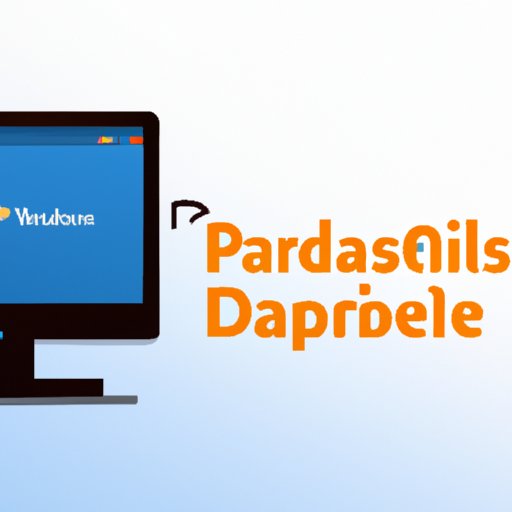
Introduction
As a Mac user, you may encounter the need to run Windows for several reasons like using specific software or games that might not be available for Apple’s operating system. Despite the differences in the operating systems, it is possible to run Windows on a Mac. In this article, we will outline several solutions that will allow you to run Windows on your Mac device efficiently.
Step-by-Step Guide: How to Install Windows on Mac Using Boot Camp
Boot Camp is Apple’s official solution to run Windows on a Mac device without using any virtualization software. Here’s how to set up Windows on your Mac using Boot Camp:
- Make sure that your Mac device meets the minimum system requirements for Windows.
- Check for updates for your Mac device and install all the latest updates.
- Download the Windows ISO file and create a bootable USB drive using Boot Camp Assistant.
- Allocate hard disk space for Windows installation using Boot Camp Assistant.
- Begin the Windows installation process by booting your Mac using the bootable USB drive, and follow the on-screen instructions to complete the installation.
- After the installation, install the Boot Camp drivers on your Windows partition.
It is essential to note that Boot Camp only supports specific versions of Windows, and you must allocate sufficient hard disk space for the operating system.
Virtualization for Beginners: Running Windows on Mac with VirtualBox
VirtualBox is a free, open-source virtualization software that allows you to run a virtual machine on your Mac device. Here’s how to set up Windows on your Mac using VirtualBox:
- Download and install VirtualBox for Mac.
- Create a new virtual machine and allocate sufficient resources.
- Mount the Windows ISO file to the virtual machine.
- Begin the Windows installation process and follow the on-screen instructions to complete the installation.
- Install VirtualBox Guest Additions on Windows for better integration with your Mac device.
VirtualBox offers flexibility and support for most Windows versions, but it requires sufficient system resources to run smoothly.

Parallels Desktop: A Simple Way to Run Windows on Your Mac
Parallels Desktop is a commercial virtualization software that allows you to run Windows on your Mac device with seamless integration. Here’s how to set up Windows on your Mac using Parallels Desktop:
- Download and install Parallels Desktop for Mac.
- Create a new virtual machine and allocate system resources as needed.
- Select the Windows ISO file and follow the on-screen instructions to complete the installation.
- Install Parallels Tools on Windows for better integration with your Mac device.
Parallels Desktop offers a user-friendly interface, seamless integration with macOS, and support for running multiple operating systems simultaneously.
Getting the Best of Both Worlds: Tips for Dual Booting Mac with Windows
Dual booting allows you to install both macOS and Windows on your Mac device. Here’s how to set up Windows on your Mac using dual booting:
- Ensure that your Mac device meets the system requirements for both macOS and Windows.
- Create a backup of your current macOS installation to avoid data loss.
- Allocate sufficient hard disk space for Windows using Disk Utility.
- Install Windows on the allocated partition and follow the on-screen instructions to complete the installation process.
- After installation, hold down the Option key to boot into either macOS or Windows.
Dual booting offers faster performance as it allows direct access to hardware, but it requires extensive preparation and significant hard disk space allocation.
Wine: Running Windows Applications on Mac Without Installing Windows
If you require to run a Windows application on your Mac without installing Windows, Wine might be the solution for you. Here’s how to set up Wine on your Mac device:
- Download and install Wine for Mac.
- Download the Windows application you want to run and install it using Wine.
- Run the application on your Mac device.
Wine can handle only some Windows applications and may not work with all applications or software.
CrossOver Mac: Experience Windows Applications with Mac Ease
CrossOver Mac is a commercial software that allows you to run Windows applications on your Mac device. Here’s how to set up CrossOver Mac on your Mac device:
- Download and install CrossOver Mac on your device.
- Select the Windows application you want to run and upload it onto CrossOver Mac.
- CrossOver Mac will automatically install and configure the application with the best settings for your Mac device.
CrossOver Mac offers better compatibility and performance than Wine but may not support all Windows applications or software.
The Ultimate Guide: Troubleshooting Common Issues When Running Windows on Mac
Even with the solutions outlined above, you may still experience some issues when running Windows on your Mac device. Here are some common issues and tips on how to fix them:
- Slow performance: Consider upgrading your hardware or allocating more resources to your virtual machine.
- No Sound: Check if your virtual machine or Boot Camp has drivers installed to handle audio.
- Networking issues: Ensure that your virtual machine or Boot Camp has the right network settings.
- Activation issues: Ensure that your Windows license is valid and activated.
- Application compatibility issues: Consider using Wine or CrossOver Mac to run the application.
If you cannot resolve the issues on your own, consider seeking assistance from Apple Support or the virtualization software support team.
Conclusion
Running Windows on your Mac device might seem challenging, but the solutions outlined in this article should make the process more manageable. Use Boot Camp, VirtualBox, Parallels Desktop, dual-booting, Wine, or CrossOver Mac to run Windows on your Mac device. Follow our step-by-step guides, consider the tips provided, and troubleshoot any issues to achieve a successful setup.




